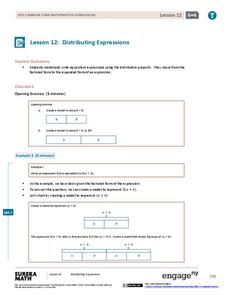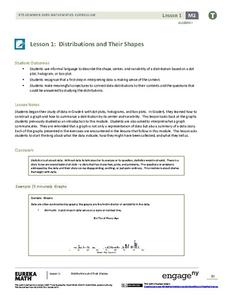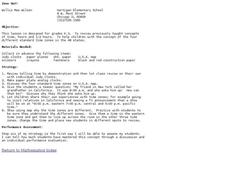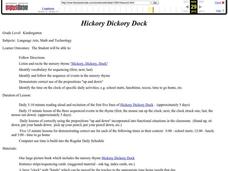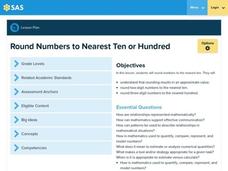Curated OER
MS Math Multiplying Fractions
Students investigate the concept of fractions using the application of a word problem. The concept is taught by giving a word problem that needs to be solved. The lesson requires strong reading comprehension and logical thinking skills.
Curated OER
Team Up for Telling Time
Students team up to compete in a variety of Internet time-telling activities. In teams of four, groups are assigned to computers and solve problems related to telling time.
American Farm Bureau Foundation for Agriculture
Shapes in Agriculture
It's time to get crafty with shapes! Your future farmers demonstrate their geometric ability by building a farm using triangles, circles, rectangles, and squares. But first, scholars take part in a brainstorm session inspired by their...
Curated OER
Probability Lesson Plans
Here is an article on how teachers can use probability lesson plans to teach their charges about theoretical and experimental probability.
EngageNY
Distributing Expressions
You know how to factor expressions; now it's time to go the opposite way. Scholars learn to write algebraic expressions in expanded form using the distributive property. A problem set helps them practice the skill.
EngageNY
Distributions and Their Shapes
What can we find out about the data from the way it is shaped? Looking at displays that are familiar from previous grades, the class forms meaningful conjectures based upon the context of the data. The introductory instructional activity...
Virginia Department of Education
Practical Problems Involving Decimals
After discussing decimals and "going shopping" in the classroom, young mathematicians are given four practical word problems that require them to estimate their answers, given specific information. The highlight of the lesson is having...
Virginia Department of Education
Functions 2
Demonstrate linear and quadratic functions through contextual modeling. Young mathematicians explore both types of functions by analyzing their key features. They then relate these key features to the contextual relationship the function...
Curated OER
Time & Itineraries Two
Learners explore time management by participating in clock reading activities. In this itinerary lesson, students define a list of time telling vocabulary terms and practice reading analog clocks with a partner. Learners identify ways to...
Curated OER
Fable of the Fainting Goat
Young scholars read a story. In this telling time lesson, students complete a worksheet where they must practice their knowledge of telling time. Young scholars read a fable and answer time questions as they read.
Curated OER
Introduction to Hours & Minutes
First graders identify, interpret, and gain proficiency in using a clock to tell time to the hour and determine how many minutes are in an hour. They identify and list what they do as they travel through their dayand how much time you...
Curated OER
Zone Out!
Students review telling time to the hour and half hour on an analog clock. In this time lesson, the students learn how to determine the time in each of the 4 standard time zones.
Curated OER
It's About Time!
Students examine the potentials, both positive and negative, of adapting an international 'Internet time' system. They create and solve word problems that require them to translate between the current time system and Internet time.
Curated OER
Time and Time Again
Students analyze the effects of time zone differences on how we function as a global community, focusing particularly on the turn of the millennium as a way for students to calculate time zone differences.
02 x 02 Worksheets
Inverse Variation
Discover an inverse variation pattern. A simple lesson plan design allows learners to explore a nonlinear pattern. Scholars analyze a distance, speed, and time relationship through tables and graphs. Eventually, they write an equation to...
Concord Consortium
Here Comes the Sun
Many phenomena in life are periodic in nature. A task-based lesson asks scholars to explore one of these phenomena. They collect data showing the sunrise time of a specific location over the period of a year. Using the data, they create...
University of Exeter
Angles and Turns
Junior geometers investigate the concepts of angles and turns using straws to perform a hands on activity. This is helpful for kinesthetic learners who have a hard time with mathematics. The lesson includes the dialogue to be used during...
Curated OER
Make a Sundial
Young scholars explore space science by conducting a sun experiment in class. In this time telling lesson, students discuss how the sun sits in our sky at exact times each day and how astronomy is based on our perspective of the solar...
Curated OER
Marshmallow Geometry
In this three-dimensional shapes geometry lesson, learners identify geometric solids and name their properties. They define "face," "edge," and "vertex," and construct geometric solids using marshmallows as vertices and toothpicks as edges.
Curated OER
The Ants Go Marching
Integrate art, math, life science, music, and fun in this beginning addition and subtraction activity. Children kinesthetically represent adding and subtracting numbers to 10; they stand up one at a time as you count forward and sit down...
Curated OER
Bar Graphs With Intervals
Give your math class a comprehensive understanding of bar graphs with this series of lessons. The resource is divided into three parts, and all of the accompanying worksheets are included. The class will study different bar graphs,...
Curated OER
Clockwise/Counterclockwise Math
Students practice the concept of moving in clockwise and counterclockwise directions to tell time using addition and subtraction.
Curated OER
Hickory Dickory Dock
Students use the Hickory Dickory Dock nursery rhyme to learn about rhyme, telling time, and preposition use. In this nursery rhyme lesson, students read the nursery rhyme daily and complete a Mother Goose quiz. Students sequence the...
Pennsylvania Department of Education
Round Numbers to Nearest Ten or Hundred
Third graders review telling time. For this lesson on telling time, 3rd graders discuss various items that show length of time, including clocks, calendars and sand timers. Students review and practice what they already know about...






